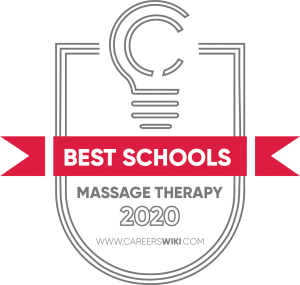…
There are six massage therapy schools in New Hampshire. Private institutes and public community colleges are in towns and cities from the northern part of the state to the south.
Full-time students earn certificates within a year or less. Some schools offer part-time and evening options. Every curriculum provides class lectures, lab work, and clinical rotations. Programs approved by state authorities have the instruction and training necessary to apply for a state license.
The future is bright for massage therapists in the Granite State, according to federal officials, who predict 360 annual job openings through 2026.
View our full list of massage schools by clicking here.

This government agency regulates the practice of massage therapy in New Hampshire. It is part of the state Division of Health Professions.
The board establishes education, training, and examination requirements for practitioners. It approves schools that meet criteria concerning curricula, and ensures that a prospective massage therapist has graduated from one of those institutions. The board issues licenses, and determines whether a person with a license from another state is eligible to practice in New Hampshire.
The board enforces license renewal and continuing education requirements, and reviews CE classes.
Another duty is to investigate complaints of illegal or unethical behavior. Practitioners who are found guilty face disciplinary action that can include the suspension or revocation of their licenses.
All three of the appointed board members are licensed New Hampshire massage therapists with at least five consecutive years of experience. They serve no more than two straight three-year terms.
To become a massage therapist in New Hampshire, a high school diploma or GED is a prerequisite. Students who take extra health and science classes in high school may enhance their chances of acceptance at schools with competitive admission policies.
Prospective practitioners need to enroll in accredited MT schools that offer programs the state board has approved. A curriculum must provide at least 750 clock hours of instruction and training. This is to include:
Some programs feature more than 750 hours. They may teach a wider range of massage modalities, include additional business-related coursework, or give students more practical experience.
Upon graduation, the next requirement is to apply for licensure. The board, which assesses an application fee of about $110, mandates an acceptable score on the Massage & Bodywork Licensing Examination (MBLEx).
The Federation of State Massage Therapy Boards charges about $200 to take the exam at a Pearson VUE testing center.
Another license qualification is to hold a certificate in adult CPR and first aid.
Practitioners must periodically renew their licenses, paying the same fee as that for the initial license. Each time, 12 hours of continuing education from a board-approved provider are required.
We selected the schools below based on the programs that they offer, accreditation, student population, graduation rate and reputation.
View our Ranking Methodology to learn more about how we rank schools.

85%
20
This Manchester school is affiliated with the American Academy of Health & Beauty. It offers a 780-clock-hour program involving 28 weeks of full-time day classes or 42 weeks of part-time evening sessions.
Students learn Swedish massage, trigger point therapy, myofascial techniques, Eastern modalities, and muscle energy. In addition to the state-required courses, they take Self Care, Body Mechanics & Nutrition; and Career Development & Employability Skills. Licensed massage therapists teach MT classes.
Classes begin three times per year, with tuition covering the cost of liability insurance. The school boasts a 100 percent pass rate on the licensing exam for its graduates.
85%
25
Located in Hudson, NHITA has been training massage therapists since 1983. The school is recognized by the prestigious Commission on Massage Therapy Accreditation (COMTA).
Students spend 625 clock hours in classrooms and 150 hours in clinics. They graduate within either 10 or 12 months. All courses are required; there are no electives.
The curriculum exceeds state standards by including classes in Injury Assessment, Lymphatic Drainage Massage, Circulatory Massage, Sports Massage, Hydrotherapy, Nutrition, and Reflexology.
18%
792
This public school, based in Claremont, offers a program on its campuses in Lebanon and Keene.
Students spend three semesters earning 37 credits. The program lasts as little as 12 months full time or 24 months part time. The curriculum covers trigger point therapy, myofascial release, cross fiber friction, muscle energy technique, and positional release technique. Classes begin in the fall, spring, and summer.
The program provides 250 hours of clinical experience, including deep tissue massages at a student clinic; plus an internship “that aligns with career goals.” There is also a capstone research project.
54%
699
A public school in the village of North Conway, WMCC primarily serves residents of northern New Hampshire as well as parts of Maine and Vermont.
The 57-credit program lasts three semesters. It meets the state board’s criteria and adds required classes in Swedish Massage I and II, Reflexology, Spa Techniques, Oriental Theory, Special Populations Massage, Deep Tissue Massage, Self Care and Stress Management, Nutrition, Sports Massage, and Introduction to Reiki Healing.
Students spend 250 hours in a pair of clinical internships at area facilities.
27%
1626
This public school in the city of the same name educates students from southern New Hampshire and surrounding areas.
The three-semester program entails a minimum of 750 clock hours and 37 credits. Among the required courses are Swedish Massage I and II, Oriental Theory and Concepts, Clinical Evaluation and Treatment, and Deep Tissue Massage.
Students also must take two of the following elective classes: Foundations of Health and Wellness, Introduction to Herbology, Spa Techniques, Sports Massage, Self-Care & Stress Management, Shiatsu, Pre/Post Natal Massage, Reflexology, Chair Massage, Aromatherapy, Somatic Massage, Trigger Point Therapy and Myofascial Release, or Nutrition.
27%
1887
Topping our list is this public school in Portsmouth, which offers a 37-credit program that lasts three semesters. Day and evening class schedules are available.
Students learn neuromuscular therapy, myofascial release, trigger point therapy, energy modalities, spa therapies, and Eastern theory and technique. They receive training in the following massage methods: full-body Swiss, seated, special populations, sports, maternity, hot stone, and orthopedic.
The curriculum features two clinical experiences. The school advises students to earn CPR and first aid certification before enrolling, and to buy massage tables and chairs so they can practice at home.
$20
$41,500
17%
The middle range of annual salaries and hourly wages for practitioners here is more than $41,500 or about $20. That is similar to the national median of over $41,400 or about $20.
The pre-eminent 10 percent of New Hampshire massage therapists make around $73,100 or over $35, less than about $78,300 or about $37.60 nationwide. The lowest-paid 10 percent receive more than $25,700 or about $12.40 in New Hampshire, and more than $21,300 or around $10.25 nationally.
The U.S. Bureau of Labor Statistics reported that this state was home to 2,810 massage therapists in 2016. The agency predicted that employment will grow to 3,300 jobs by 2026. That would be a 17 percent expansion rate, slower than the projected national average of 26 percent.
Sources: U.S. Bureau of Labor Statistics, CareerOneStop

LIMITED TIME DEAL